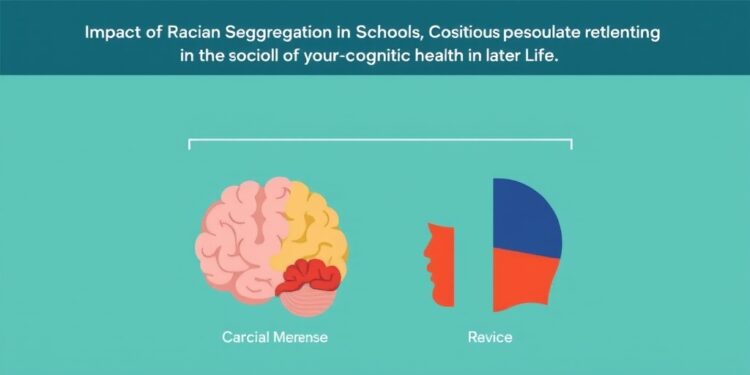In recent years, the impact of early educational experiences on cognitive health in later life has emerged as a significant area of research. A groundbreaking cross-sectional study has shed light on the intricate relationship between childhood exposure to school segregation and cognitive function in older adults, particularly among the Black population. This research underscores a troubling reality—the lingering effects of systemic inequalities are woven into the very fabric of educational experiences. As the United States grapples with rising school segregation trends, the implications for public health and educational policy could not be more urgent.
At the heart of the study is the important consideration of how childhood environments, specifically educational settings, can manifest in health disparities later in life. The findings reveal that Black individuals who experienced segregated schooling during their formative years demonstrated notable declines in cognitive abilities as they aged. This raises critical questions about the long-term effects of systemic racism and inequality on mental health and cognitive functioning. It suggests that educational inequities are not just historical artifacts but have direct repercussions on the cognitive health of generations.
Importantly, the study positions itself within a broader narrative on health equity. It points to the necessity for educational policies that promote integration and inclusivity as a means of fostering healthier futures for youth from all backgrounds. The implications for clinicians are profound; understanding the educational histories of patients can enhance screening procedures for cognitive impairments and encourage proactive management strategies. This approach compels healthcare professionals to recognize the social determinants of health that extend beyond immediate medical care.
As the study outlines, the context of childhood education plays a pivotal role in shaping cognitive outcomes. The researchers discovered that the consequences of growing up in segregated schooling environments were particularly pronounced among Black individuals compared to their white counterparts. This disparity highlights the multifaceted nature of cognitive decline, where systemic factors intersect with educational experiences to create a unique set of challenges for marginalized populations.
The research reinforces the notion that addressing health disparities necessitates a holistic understanding of the societal structures at play. It urges policymakers to prioritize equity in educational access, as the benefits extend beyond academia and into the realm of public health. As educational divisions continue to persist, there is an urgent need for targeted programs that dismantle these barriers and promote a more equitable learning environment.
Furthermore, the findings of this study could catalyze important discussions about the role of education in health policy. Initiatives that seek to reduce segregation in schools must be viewed as essential components of broader public health strategies aimed at improving cognitive health outcomes for vulnerable populations. As awareness grows, the medical community may find itself advocating for educational reforms that address the systemic roots of health inequalities.
Moreover, the research highlights a critical area for future investigation—the specific cognitive mechanisms that may be influenced by school segregation. While the current study establishes a correlation, further exploration is needed to understand the nuances of how educational quality and access impact cognitive processes over time. Delving into these complexities will enhance our understanding of cognitive disorders and inform more effective intervention strategies tailored to the unique needs of different populations.
In concluding remarks, the study serves as a clarion call for both educational and health systems to acknowledge the interplay of environment, history, and health. As the United States confronts its legacy of segregation, the findings urge a reevaluation of how childhood experiences shape lifelong health trajectories. The community is called upon to foster educational environments that are inclusive, equitable, and conducive to the cognitive well-being of all children.
The dialogue surrounding these findings must extend beyond academics and healthcare. Engaging the public in discussions about the implications of childhood education on mental health can galvanize grassroots movements advocating for systemic reforms. Community stakeholders, educators, and healthcare providers must collaborate to establish a unified front in addressing the issues that perpetuate health disparities.
As we stand at this intersection of education and health, the opportunity to effect meaningful change presents itself. With a focused commitment to dismantling the structures of segregation, we can pave the way for healthier future generations. The insights garnered from this study could very well influence the trajectory of educational policies aimed at fostering an environment where all children can thrive without the shadow of segregation clouding their potential.
In essence, the research underscores a fundamental truth: the health of a community is intricately linked to the health of its educational systems. By investing in equitable access to quality education, we are not just creating opportunities for academic success but also fortifying the cognitive resilience of our populations. The time is ripe for action, and the lessons learned from this study could be the key to unlocking a healthier future for all.
Fight for these changes is not merely a legal or political endeavor; it is a moral imperative rooted in a commitment to health justice for all communities. The evidence is clear, and the call to action resounds across the fields of education, public health, and social justice. This study is not just about the past; it is about shaping a healthier, more equitable future for generations to come.
Every child deserves an educational experience that uplifts and empowers them, free from the burdens of segregation. The path forward lies in collective action, informed by research like this, to dismantle barriers and pave the way for inclusive, equitable, and thriving educational environments.
Subject of Research: The impact of childhood exposure to school segregation on late-life cognition.
Article Title: Study explores the effects of school segregation on cognitive health in Black older adults.
News Publication Date: The publication date will be determined upon release.
Web References: Not available at this time.
References: Not available at this time.
Image Credits: Not available at this time.
Keywords: School segregation, cognitive health, health inequities, educational policy, systemic racism, public health, cognitive disorders, mental health, social determinants of health.




